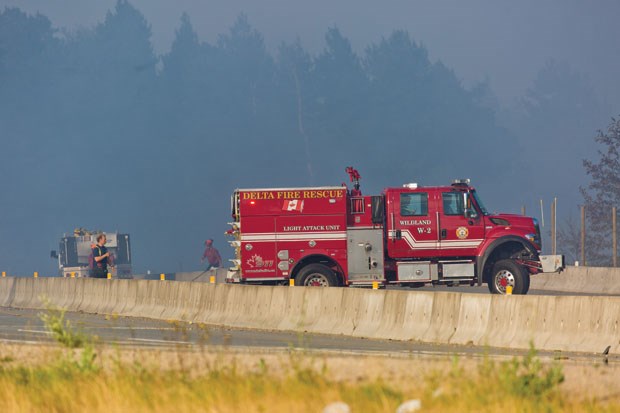Even though it burned for three days, it was in the critical first few hours of the recent Burns Bog fire that Delta firefighters won their biggest battle, saving an industrial park from destruction and preventing what could have been a major economic disaster for the region.
The bog fire, which started July 3, quickly jumped Highway 17 where it threatened the Tilbury Industrial Park. If the densely-packed lumber yard had caught fire, the ensuing inferno would likely have spread quickly to other businesses.
Like the recent wildfire that ravaged Fort McMurray, firefighters, both locally and nationally, say the bog fire proves that adequate frontline emergency response resources - such as personnel, vehicles, equipment and training - can be a major determining factor in the outcome of a large-scale disaster.
"The media often reports fire loss, but they rarely report what was saved," said Scott Marks, a retired Toronto firefighter who now heads the International Association of Fire Fighters' Canadian operations.
"These fires prove once again that fire protection is an investment that pays dividends in the form of lives and property saved and reduced economic impact when jobs are saved."
Delta firefighter Mike McMillan, who is also president of the Delta Professional Firefighters' Association, said the municipality's level of preparedness saved residents and businesses from major impacts from the 80-hectare bog fire.
"We stopped this fire where we did only because Delta has a staffed, fulltime fire department that has invested wisely in apparatus, equipment and training," said McMillan. "Every year all our suppression staff re-certify in wildland firefighting and train on all our equipment, including a wildland firefighting apparatus, which proved itself at this fire."
That level of preparedness not only provided a quick response to the bog fire, but it allowed firefighters to simultaneously respond to an unrelated structure fire in another area of Delta, respond to a highway rollover and use their enhanced medical skills to provide immediate attention to a fellow firefighter who suffered a medical emergency during the bog fire response.
While all professional firefighters across Canada provide some level of medical response, Delta firefighters, who often arrive on scene before ambulances, began offering enhanced medical response last year.
Marks said when a major disaster strikes, cities with adequate frontline resources are better positioned to get a jump on their response and mitigate the impacts. He said this reality flies in the face of a report issued by the Fraser Institute last year that argued Canadian municipalities employ too many firefighters.
"We didn't see any newspaper columnists arguing that there were too many firefighters during the Fort McMurray crisis or the Delta bog fire," Marks added.
"That's because people ultimately realize that having effective fire protection is like insurance. You may not need it every day, but when you do, you're extremely glad it's there."



